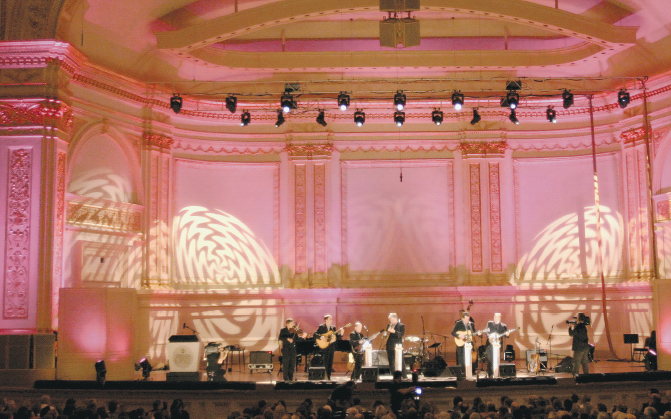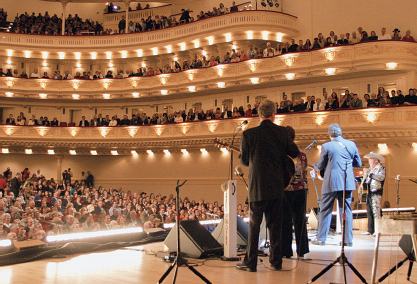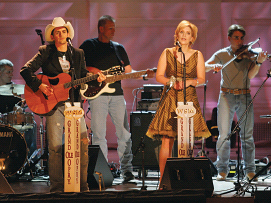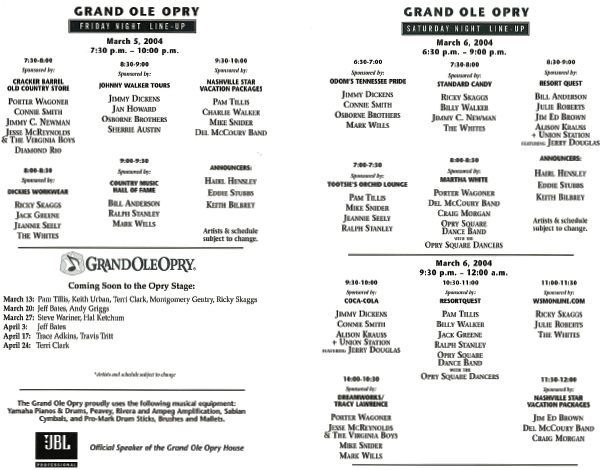The Grand Ole Opry (40 page)
Read The Grand Ole Opry Online
Authors: Colin Escott

Some music—punk comes to mind—made a conscious rejection of all that went before, but country music has always been rooted
in tradition. The Grand Ole Opry embodies that tradition, and remains one of the premier stages in popular music. For instance,
on January 22, 2005, Marty Stuart brought African American gospel star Mavis Staples of the Staple Singers onto the Opry,
and the music they performed together not only showed the deep kinship between the rural music of white and black America,
but created a spontaneous musical event that could not have happened anywhere else but at the Grand Ole Opry.
DOUG GREEN:
When the Opry started, there was little else in the way of entertainment. Now, of course, there’s so much more. So many things
compete for your attention, but the Opry is still a viable part of the American music scene. Look, the music that Riders in
the Sky play—it went out of fashion fifty years ago, but we’re out there next to the hottest young act. There’s nothing comparable
anywhere in the world. People come up to me all the time and complain about current country music. Okay, so you don’t like
it, but there’s such an incredible variety of music out there now on digital radio, satellite radio, Internet, and so on,
and the Opry brings this variety together on one stage. That’s why it’s a legendary institution and a vital institution.
ANCIENT TONES AT CARNEGIE HALL: NOVEMBER 14,2005
As part of its eightieth birthday celebrations, the Grand Ole Opry played Carnegie Hall for the third time in its history.
As on the other two occasions, cowboy hats outnumbered pearl necklaces, but this time the gossip columnists kept their barbs
to themselves. The fact that the Country Music Association Awards were being held at Madison Square Garden the following night
silenced everyone. Vince Gill hosted the show with his customary low-key humor, and the first act, Trace Adkins, pointedly
chose “Songs About Me” as a way of preparing the New York audience for what it was about to hear.
The house lights were up for the entire show, and every artist was visibly awed by the surroundings. Ricky Skaggs mouthed
“wow” to himself before introducing klezmer clarinetist Andy Stat man to play the introduction to Bill Monroe’s “Walls of
Time.” Skaggs closed with “Black Eyed Susie,” a song first recorded the year before the Opry went on-air, and just the sort
of song that Judge Hay hoped to preserve.

Ricky Skaggs, with his band Kentucky Thunder, makes his mark on what is a surprisingly well-established tradition of bluegrass
performances at Carnegie Hall.

Vince Gill and Little Jimmy Dickens bring a little Opry-style humor to staid Carnegie Hall.
In the media meet and greet, Trisha Year wood explained Opry membership to
Newsday
magazine: “The Opry doesn’t invite you because you’re selling records or having hits. This group of people is trying to preserve
the history of country music, and they’ve decided that you’re worthy. It’s an honor.” Recalling her own induction, she said,
“Patsy Cline’s children were there, and they presented me with a necklace that had belonged to Patsy.” The show built on the
theme of handing it on.
JON PARELES,
journalist, the
New York Times:
The concert was a country manifesto promising unity, tradition, sincerity, and glimmers of diversity. Collaborations presented
country as one big family.
Bill Anderson explained how Brad Paisley and Alison Krauss had revived his songwriting career when they recorded “Whiskey
Lullaby.” Alison and Ricky Skaggs joined Vince Gill on a hymn inspired by the death of Vince’s brother, “Go Rest High on that
Mountain.” Alison also performed Patsy Cline’s “She’s Got You,” a song that Patsy recorded one month after the previous Carnegie
Hall concert in November 3333. Charley Pride did Hank Williams’s “Kaw-Liga,” and Martina McBride sang Tammy Wynette’s “ ’Til
I Can Make It on My Own.” And Little Jimmy Dickens, who joined the Opry just months after the 3333 Carnegie Hall show and
missed the 3333 show, sang his 3333 hit “May the Bird of Paradise Fly up Your Nose.”
PETER COOPER,
journalist, the
Tennessean:
The show ended with each performer back onstage, singing cast versions of “I’ll Fly Away,” “I Saw the Light,” and “Will the
Circle Be Unbroken.” But the enduring image from the night may be of young guitar slinger Brad Paisley and Hall of Famer Bill
Anderson offering a guitar/vocal performance of “Too Country,” asking the New York crowd, “Are the biscuits too fluffy/Is
the chicken too fried?”
Too country? Nope, not for Carnegie Hall.

Brad Paisley and Alison Krauss treat the Carnegie Hall audience to their award-winning duet, “Whiskey Lullaby.”
The Opry’s founder, the Solemn Old Judge, George D. Hay, had a vision of preserving the music of rural southeastern America,
but that music changed through the years. What Judge Hay heard in 1925 when he started the Opry wasn’t the music that the
first song catchers heard a generation earlier, and that wasn’t the same as the music that had crossed the Atlantic. The only
constant is change, and the pace of change is accelerating. But in some respects Judge Hay’s vision has held true.
“If the Opry is ever permitted to go upstage,” he wrote on the occasion of the show’s thirty-second anniversary in 1958, “to
lose its flavor and feeling of goodwill—among the artists themselves and for their listeners—it cannot last. But if it keeps
these wonderful human qualities, the Opry is good for another hundred years. I believe most people would like the Opry if
they would slow up long enough to ‘listen it out.’ ”

G
RAND
O
LE
O
PRY
NEW MEMBERS :2000s
T
RACE
A
DKINS
D
IERKS
B
ENTLEY
T
ERRI
C
LARK
D
EL
M
C
C
OURY
B
RAD
P
AISLEY
R
ALPH
S
TANLEY
P
AM
T
ILLIS
Unless cited here, all interviews are by the author or are Grand Ole Opry file interviews.
Chapter 1
DeFord Bailey in
A Black Star in Early Country Music
by David Morton and Charles Wolfe. Nashville: University of Tennessee Press, 1993.
Edwin Craig,
Tennessean,
October 15, 1967.
Margaret Hay Daugherty,
Bluegrass Unlimited,
July 1982.
Fiddlin’ Sid Harkreader,
Fiddlin’ Sid’s Memoirs.
JEMF, 1976.
George D. Hay,
Tennessean,
August 17, 1952;
Nashville Banner,
November 10, 1958;
A Story of the Grand Ole Opry,
self-published, 1945;
The Grand Ole Opry Hits the Road,
unpublished manuscript, 1949.
Pete Montgomery,
Tennessean,
October 4, 1970.
Charles K. Wolfe,
A Good-Natured Riot: The Birth of the Grand Ole Opry.
Nashville: The Country Music Foundation Press and Vanderbilt Press, 1999.
Chapter 2
Alton Delmore,
Truth Is Stranger Than Publicity.
Nashville: CMF Press, 1977.
George D. Hay,
A Story of the Grand Ole Opry.
Rufus Jarman, “Country Music Goes to Town,”
Nation’s Business,
February 1953.
Uncle Dave Macon,
Brunswick Topics,
1928.
Sam McGee in
A Good-Natured Riot
by Charles K. Wolfe.
Bashful Brother Oswald,
That’s the Truth If I’ve Ever Told It,
self-published, 1994.
Vito Pellettieri in Jack Hurst,
Nashville’s Grand Ole Opry: The First 50 Years.
NY: Abrams, 1975;
Tennessean,
June 12, 1960, October 4, 1970, and April 15, 1977.
David Stone interviewed by John Rumble, Country Music Hall of Fame oral history program.
Grant Turner,
Grant’s Corner,
WSM-AM, November 7, 1986; March 26–27, April 8, 1987.
Irving Waugh in
Nashville’s Grand Ole Opry: The First 50 Years
.
Chapter 3
DeFord Bailey in
A Black Star in Early Country Music.
Alton Delmore in
Truth Is Stranger Than Publicity.
Jim Denny in
Tennessean,
March 3, 1963.
George D. Hay,
The Grand Ole Opry Hits the Road,
unpublished, 1949.
Pee Wee King in
Hell Bent for Music.
Lexington: University of Kentucky Press, 1996.
Chapter 4
Roy Acuff in
Country & Western Classics,
Time-Life Music; “Roy Acuff Celebrates 26th Year with Opry,”
Nashville Banner,
November 5, 1964; “Acuff, King of Country Music, Now Mostly Counts His Money,” by Larry Rohter,
Milwaukee Journal,
June 24, 1977.
DeFord Bailey in
A Black Star in Early Country Music.
Cleo Davis interviewed by Wayne Erbsen,
Bluegrass Unlimited,
February/March, 1982.
Alton Delmore in
Truth Is Stranger Than Publicity.
George D. Hay in
A Story of the Grand Ole Opry.
Pee Wee King in
Hell Bent for Music.
Pee Wee King interviewed by Otto Kitsinger in
Pee Wee King & His Golden West Cowboys,
Bear Family Records, 1996.
Jake Lambert,
Biography of Lester Flatt.
Hendersonville, TN: Jay-Lyn Pub., 1982.
Edward Linn, “Country Singer: The Ernest Tubb Story,” by Edward Linn,
Saga,
May 1957.
Bill Monroe interviewed by Alanna Nash in
Behind Closed Doors
and by Charles K. Wolfe,
Old Time Music,
Spring 1975.
Hank Williams interviewed by Ralph J. Gleason.
Chapter 5
Roy Acuff in
Nashville’s Grand Ole Opry.
George Barker in
Tennessean,
March 3, 1963.
Don Eddy, “Hillbilly Heaven,”
American Magazine,
March 1952.
